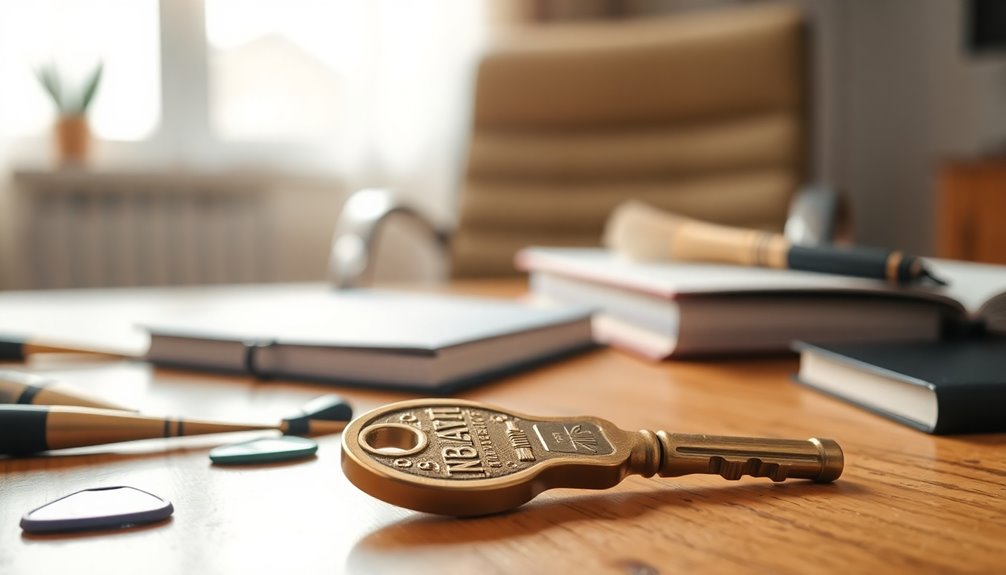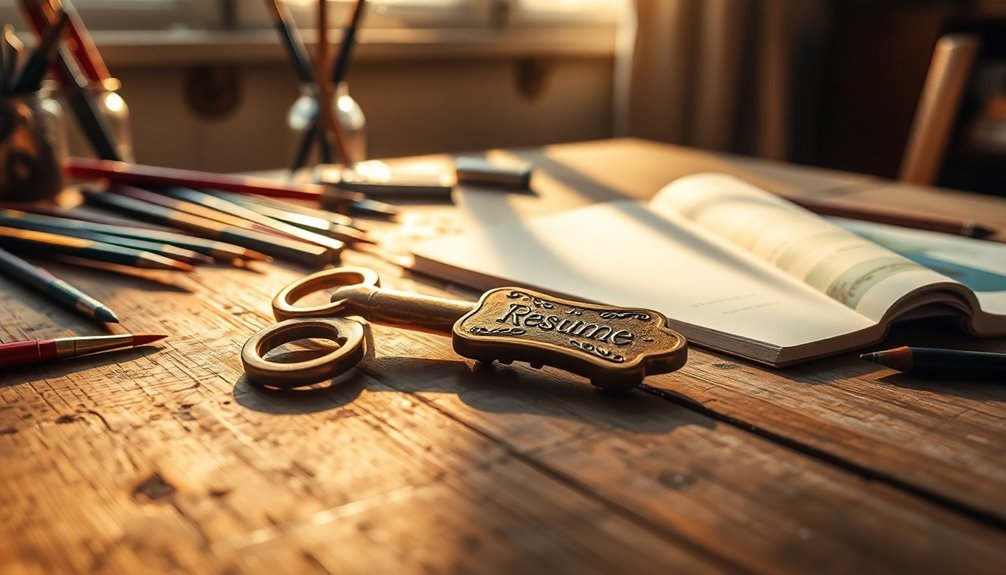Revealing your hobbies can be your secret weapon in a job interview. They reveal your personality and showcase skills beyond your resume. By aligning your hobbies with the job role, you can highlight teamwork or creativity that the employer values. When discussing these interests, use the STAR method to structure your responses clearly. Don't forget to express enthusiasm for how these activities enhance your well-being and contribute to a balanced lifestyle. Engaging with potential employers over shared interests can create lasting connections, creating pathways to future opportunities. There's much more to discover about how hobbies can enhance your candidacy.
Key Takeaways
- Highlight hobbies that demonstrate skills relevant to the job, such as teamwork, creativity, or adaptability.
- Use the STAR method to structure your responses, focusing on learning experiences from your hobbies.
- Research the company culture and align your hobbies with their values to showcase fit.
- Engage with interviewers by discussing shared interests and asking about team-building activities.
- Follow up with a thank-you email, referencing hobbies discussed to reinforce connections made during the interview.
Significance of Hobbies in Interviews

Hobbies play an essential role in job interviews, often serving as a window into your personality and character. When you share your interests, you give employers a glimpse of who you're beyond your resume. They can reveal applicable skills, such as teamwork from sports or creativity from art.
Engaging in diverse activities shows that you're well-rounded and adaptable, qualities many employers value. Furthermore, your hobbies can indicate your commitment to personal growth, which is appealing in a candidate. Additionally, involvement in hobbies can enhance your self-awareness and help you articulate how your experiences relate to the job at hand.
Aligning Hobbies With Job Roles

When preparing for a job interview, aligning your hobbies with the specific role can greatly enhance your candidacy. Take time to review the job description and identify key skills the employer seeks.
For instance, if the position requires teamwork, highlight hobbies like team sports or group volunteering that showcase your collaborative spirit. Engaging in community and support networks can also illustrate your ability to work well with others and contribute positively to a team environment, as shared experiences can enhance your connections with colleagues. If creativity is essential, discuss artistic pursuits or innovative projects you've undertaken. Additionally, leveraging your growth mindset can demonstrate your adaptability and willingness to learn in a dynamic work setting. Research the company culture, too; if they value community involvement, mention related activities you're passionate about. Additionally, demonstrating your commitment to self-care practices can indicate to employers that you prioritize your well-being, which is essential for maintaining productivity and resilience in a work environment.
Crafting Effective Interview Responses

Crafting effective interview responses is essential for making a strong impression on potential employers. Start by identifying one or two hobbies that resonate with the job you're applying for. Highlight the skills or qualities gained from these activities, ensuring they align with the company's values.
Use the STAR method to structure your answers, providing clear examples of how your experiences relate to the role. Avoid negative comments about previous employers; instead, focus on what you learned. Personal anecdotes can demonstrate your character and fit for the position.
Finally, conclude your response by asking how you can apply your interests within the company, showing your enthusiasm for integrating your passions into the workplace.
Engaging With Potential Employers

Engaging with potential employers goes beyond just answering questions; it's about building a connection that reflects your personality and interests.
When discussing your hobbies, highlight how they align with the company's values and culture. Use these moments to demonstrate skills that matter to the role. Additionally, be mindful of your cookie preferences, as they can enhance your online application experience. Consider that AI technologies can also help streamline the application process and improve candidate matching. Engaging in nighttime meditation can also help you to feel more centered and focused during the interview process.
Ask thoughtful questions about the workplace, like team-building activities or community service initiatives, showing your enthusiasm for contributing to the company. This not only illustrates your interest but also sparks meaningful conversations. Additionally, consider sharing how your hobbies, such as regular physical activity, contribute to a balanced lifestyle that can boost your overall productivity at work.
Body Language and Presence

Effective body language and presence can considerably influence the outcome of your interview. By demonstrating confidence and engagement, you can create a positive impression on your interviewer. Focus on maintaining eye contact, sitting up straight, and using open gestures.
| Positive Body Language | Impact on Interview |
|---|---|
| Maintaining eye contact | Shows confidence and interest |
| Open posture | Communicates approachability |
| Active listening | Demonstrates engagement |
Mirroring the interviewer's posture can also foster rapport. Be mindful of any distracting movements, as these can detract from your message. Ultimately, staying present and engaged throughout the conversation is key to conveying your enthusiasm for the role and the company.
Following Up After Interviews

After an interview, a thoughtful follow-up can set you apart from other candidates. Send a thank-you email within 24 hours to express your gratitude for the opportunity and the time the interviewer spent with you.
Be sure to mention specific topics discussed during the interview to reinforce your connection. This not only shows your appreciation but also highlights your attentiveness.
Reiterate your interest in the position, emphasizing how your skills and hobbies align with the company's values. Keep the tone professional yet friendly, and avoid being overly formal.
Following up demonstrates your enthusiasm and commitment, leaving a lasting impression that can enhance your candidacy. Remember, this small step could be a key factor in the decision-making process.
Leveraging Hobbies for Career Growth

Leveraging your hobbies can greatly enhance your career growth by showcasing unique skills and qualities that set you apart from other candidates.
When you effectively communicate your passions during interviews, you not only reveal your personality but also demonstrate valuable traits employers seek.
- Problem-solving: Hobbies like gaming or puzzles highlight your analytical thinking. Engaging in STEM toys can further enhance your problem-solving abilities through hands-on learning experiences. Additionally, focusing on developmental benefits through educational toys can sharpen your critical thinking skills. Furthermore, studies show that early exposure to STEM builds foundational skills for future learning.
- Teamwork: Group activities such as sports or volunteering showcase your collaboration skills.
- Creativity: Artistic pursuits or writing can display your innovative thinking.
Additionally, engaging in activities like puppy training classes can demonstrate your commitment to personal growth and responsibility.
Frequently Asked Questions
How Can I Identify My Most Relevant Hobbies for Interviews?
To identify your most relevant hobbies for interviews, start by reviewing the job description.
Look for skills or traits it emphasizes and match them with your interests.
Think about hobbies where you've developed applicable skills or demonstrated teamwork.
Research the company culture to see which of your interests align.
Finally, create a list of those hobbies, focusing on how they showcase your personality and fit for the role.
What if My Hobbies Don't Relate to the Job at All?
Think of your hobbies as unique colors on your palette.
Even if they don't directly relate to the job, they showcase your creativity and versatility. Employers appreciate diverse experiences that can bring fresh perspectives.
You can emphasize skills gained from these hobbies, like teamwork or problem-solving.
Just convey how these interests shape you as a person, and you'll reveal qualities that make you a valuable addition to their team.
Should I Mention Hobbies That Are Controversial or Polarizing?
You should be cautious about mentioning hobbies that are controversial or polarizing during an interview.
While authenticity is important, these interests might distract from your qualifications or create discomfort. Instead, focus on hobbies that reflect your skills or character positively.
If you feel strongly about a controversial hobby, consider how it aligns with the company's culture before bringing it up.
It's best to keep the conversation professional and inclusive.
How Can I Balance Discussing Hobbies With Professional Qualifications?
So, you're worried about mixing hobbies with your professional qualifications?
Imagine this: a magician pulling a rabbit from a hat, only to reveal it's a résumé! You can balance the two by selecting hobbies that highlight skills relevant to the job.
When discussing your interests, show how they enhance your qualifications. Keep it light, but make certain your passions align with the role's requirements, making you memorable for all the right reasons.
What if I Have No Hobbies to Share During the Interview?
If you feel like you don't have any hobbies to share during the interview, don't worry.
Think about activities you enjoy, even if they seem small. Consider volunteer work, casual sports, or even reading. These interests can reveal valuable skills and traits.
It's important to focus on how these experiences have shaped you and contributed to your personal growth. Employers appreciate authenticity, so be honest and highlight what you're passionate about, no matter how minor.
Conclusion
Incorporating your hobbies into your interview strategy can be a game-changer, setting you light-years ahead of other candidates. By showcasing how your passions align with the company's values, you create a vivid picture of your unique fit. Remember, your interests aren't just side notes; they're powerful stories that add depth to your professional persona. Embrace this opportunity, and watch how your hobbies open doors to your dream job, propelling your career to new heights!
Eugene brings a fresh, dynamic voice to our platform as one of our talented Writers. Specializing in research-driven content, he explores the latest findings in psychology and personal growth, translating them into actionable insights for our readers. Eugene’s work is fueled by a curiosity about what makes us tick and a desire to help others unlock their potential.










